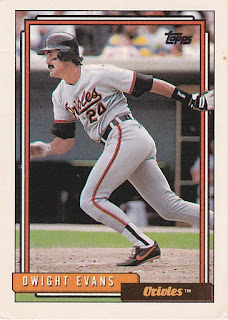Baltimore Orioles Victory Number 17: 5-3 over the Detroit Tigers
1992 Topps Dwight Evans
The Orioles made it two out of three over the holiday weekend as they dispatched the Tigers at home Monday afternoon. Dan Strailey, most likely not long for an Orioles uniform, picked up the win. It just so happens that the next photo queued up was of another major league player whose stint with the Orioles wasn't long remembered by most fans.
Following the "Why Not?" season of 1989 that saw the Orioles battle for the AL East title until the final weekend in Toronto, Baltimore stumbled back to fifth place in 1990. In order to boost the play of some of the young players such as Brady Anderson, Chris Hoiles and Leo Gomez, the front office made some moves to bring in some veterans.
Mickey "Fruit Loops" Tettleton was traded to the Tigers for pitcher Jeff Robinson, Mickey Weston was traded to Texas for lefthander Paul Kilgus and they traded Curt Schilling, Steve Finley and Pete Harnisch to Houston for slugger Glenn Davis. They also signed 19-year veteran Dwight Evans as a free agent.
Evans, then 39 years old, was coming off of a season where he slashed .249/.349/.391 for the Red Sox and battled back injuries that limited him to just 123 games, his lowest total since 1981. The Orioles envisioned him as a bit of a fulltime utility player, splitting time in the outfield, as DH and possibly at first base, a position he had played rarely over his Red Sox career.
Manager Frank Robinson said when the signing was made:
"We just feel like we can use the experience of a player of Dwight's caliber. We feel he can give us some production and some leadership"
General Manager Roland Hemond took his praise a bit further when talking about his $1.3 million signing:
"To have someone of his stature join our club is a big plus. He's such a fine all-round player, he's a future Hall of Famer"
The leadership wasn't enough to overcome the Orioles deficiencies. Despite a bit of a rebound season for Evans (.270/.393/.378 in 101 games) Baltimore finished in sixth place in 1991 in part due to the failure of Davis to stay healthy and the pitching staff's inability to get people out. He was in the line-up for the final game in Memorial Stadium (1-2 with a walk). A calf injury limited his time, but he did return to the outfield (where his six assists showed signs of the rifle of an arm that was a hallmark earlier in his career) for the Orioles throughout the year.
It was a good enough performance for the team to re-sign him in the off-season, but he wouldn't make it through the spring. Concerns about his health and the need to find spots on the roster for young players like Chito Martinez and David Sequi led to the Orioles cutting him in March. He retired after 20 seasons in baseball with 8 gold gloves and as one of only 10 players to have played in at least 100 games in 19 plus seasons.
He was also a really, really good blend of offense and defense. Bill James and others have made the case that he should be in the Hall of Fame for his merging of the two disciplines and with the voters leaning more to a more open eye to players who didn't have the magic numbers normally associated with Hall of Famers, maybe he'll soon join the growing list of aging veterans that wandered into a Baltimore uniform at the end of their career before being inducted in Cooperstown. I'm looking at you Vlad Guerrero, Lee Smith, Tim Raines, and Jim Thome.


No comments:
Post a Comment